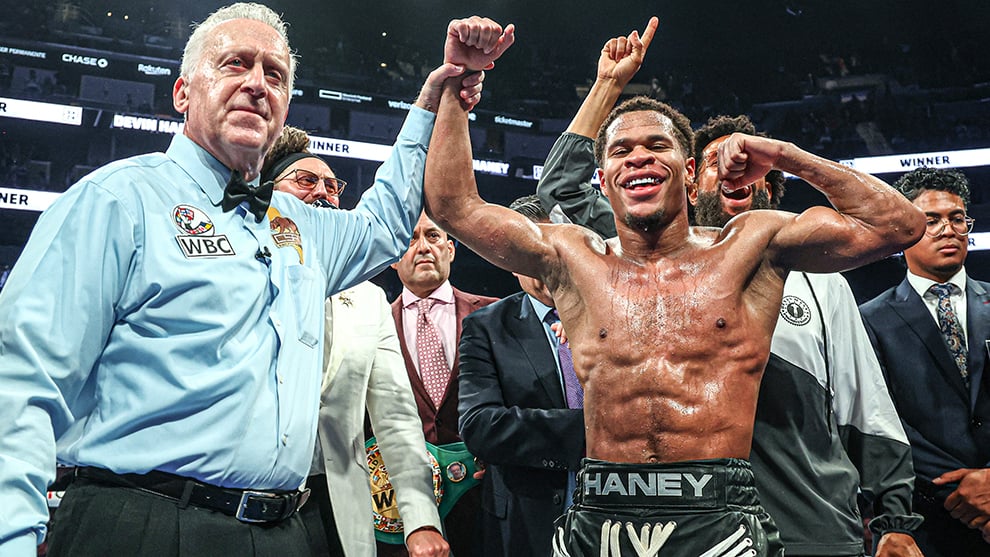By Elliot Worsell
ALTHOUGH it is perhaps hard to believe at a time like this, when nuance and shade are the enemies, and when everything must be either black or white, or good or bad, two seemingly contradictory viewpoints can still be both true.
For instance, in boxing terms, a fight can be both boring and brilliant, just as a fighter can be both boring and brilliant. They don’t have to be one or the other. Indeed, the two things – boring and brilliant – in many ways coexist for a reason and often you will find a boxer’s brilliance is such that the fight they are winning becomes so one-sided it tests the patience of both their opponent and the fans.
This proved the case again tonight (December 10) in San Francisco, where Devin Haney successfully moved from lightweight to super-lightweight to bamboozle and ultimately dethrone Regis Prograis, the WBC belt-holder, over 12 rounds. A victory by three scores of 120-107, it was in the end a continuation of a theme for Haney; that is, a lopsided decision win against an opponent unable to get to grips with him or even so much as slow him down. In control from the very outset, he boxed with the confidence and swagger of a man unconcerned by the jump in weight and with no respect for the danger of the opponent – a “champion” no less – standing in front of him. He moved with the ease of a man unbeaten now in 31 pro fights and his jab, which was so key to him twice beating George Kambosos in Australia last year, was again excellent and remains as good as anyone’s in the sport today.
In fact, so comfortable was Haney in there with Prograis tonight it made a mockery of the weeks of trash talk to which both had contributed in anticipation of this fight. A selling tactic, sure, there was nevertheless a sense of conviction in Prograis’ words which on the night betrayed him entirely and resulted in the fight sharing more in common with a typical mismatch than a so-called superfight. This feeling was backed up by the numbers, too, which indicated Prograis had landed just 36 of 363 thrown punches in the 12 rounds he shared with Haney.
That, of course, suggests not only Prograis flattered to deceive when the talking stopped and it was time for action, but also, and more importantly, it suggests Haney was really on it tonight – which he was. In restricting Prograis to a mere 10% connect rate, as well as landing 129 of his own 367 thrown punches, Haney delivered, both on paper and in reality, the very performance he would have been eyeing back when this fight was made. Because as far as he is concerned, entertainment is secondary to victory. Moreover, victory in a fight in which he was punched just 36 times will be seen by Haney and his team as total victory; better, perhaps, than even a dramatic, eye-catching knockout in a slugfest; better even than coming out on top in a “Fight of the Year” contender.
Haney troubles Prograis (Ed Mulholland/Matchroom)
Like it or not, that’s simply Haney’s mentality. It is one that has served him well so far and it is one hard to criticise when aware of boxing’s rich history of taking from boxers as much as it gives them. In fact, in a sport of give and take, it is surely always wise to give more than you take and to leave the ring on fight night feeling as though this, more than anything, represents success.
For Haney, now 31-0 (15), it certainly did. It represented success in the traditional way – dropping Prograis with a right hand in round three before winning a fight on points – and it also represented success in a less traditional way; a way understood only by boxers and, chiefly, only by those two boxers sharing a ring at the same time. Consider, for example, the speed with which Prograis approached Haney at the bout’s conclusion, having just spent 12 rounds getting nowhere near him, and wrapped his arms around him in an embrace. It was in this embrace he then took a moment to express not his frustration with Haney for the way he went about beating him but instead his respect.
Eight weeks ago, this respect was something Prograis withheld; eight hours ago, too. But now, after sharing the ring with Haney and realising everything he planned to do to him was seemingly impossible in reality, it was easy for him to give it up. It would have been important for Haney to have received this respect as well, you sense, if only because it signified he had done a thorough and humbling job on a rival who, pre-fight, had hardly a good word to say about him.
As always, the respect from fans will be tougher to obtain, for fans, unlike Regis Prograis, have only watched Haney’s brilliance from afar and never actually felt it. With a few more performances like this, however, and with more weights conquered, it’s likely these fans will one day come to see Haney the way they came to see other gifted fighters whose entertainment value was in the end to be found in their risk-taking and how easy they made supposedly difficult tasks look when it mattered. And for Devin Haney, known as “The Dream”, that really is the dream.
Haney was more of a nightmare than anything for Regis Prograis (Ed Mulholland/Matchroom)
